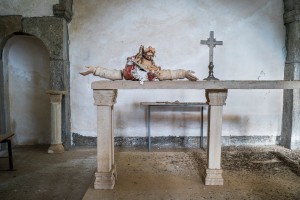Is This the End of Christianity in the Middle East?
< < Go Back
ISIS and other extremist movements across the region are enslaving, killing and uprooting Christians, with no aid in sight.
here was something about Diyaa that his wife’s brothers didn’t like. He was a tyrant, they said, who, after 14 years of marriage, wouldn’t let their sister, Rana, 31, have her own mobile phone. He isolated her from friends and family, guarding her jealously. Although Diyaa and Rana were both from Qaraqosh, the largest Christian city in Iraq, they didn’t know each other before their families arranged their marriage. It hadn’t gone especially well. Rana was childless, and according to the brothers, Diyaa was cheap. The house he rented was dilapidated, not fit for their sister to live in.
Qaraqosh is on the Nineveh Plain, a 1,500-square-mile plot of contested land that lies between Iraq’s Kurdish north and its Arab south. Until last summer, this was a flourishing city of 50,000, in Iraq’s breadbasket. Wheat fields and chicken and cattle farms surrounded a town filled with coffee shops, bars, barbers, gyms and other trappings of modern life.
Then, last June, ISIS took Mosul, less than 20 miles west. The militants painted a red Arabic ‘‘n,’’ for Nasrane, a slur, on Christian homes. They took over the municipal water supply, which feeds much of the Nineveh Plain. Many residents who managed to escape fled to Qaraqosh, bringing with them tales of summary executions and mass beheadings. The people of Qaraqosh feared that ISIS would continue to extend the group’s self-styled caliphate, which now stretches from Turkey’s border with Syria to south of Fallujah in Iraq, an area roughly the size of Indiana.
In the weeks before advancing on Qaraqosh, ISIS cut the city’s water. As the wells dried up, some left and others talked about where they might go. In July, reports that ISIS was about to take Qaraqosh sent thousands fleeing, but ISIS didn’t arrive, and within a couple of days, most people returned. Diyaa refused to leave. He was sure ISIS wouldn’t take the town.
A week later, the Kurdish forces, known as the peshmerga, whom the Iraqi government had charged with defending Qaraqosh, retreated. (‘‘We didn’t have the weapons to stop them,’’ Jabbar Yawar, the secretary general of the peshmerga, said later.) The city was defenseless; the Kurds had not allowed the people of the Nineveh Plain to arm themselves and had rounded up their weapons months earlier. Tens of thousands jammed into cars and fled along the narrow highway leading to the relative safety of Erbil, the Kurdish capital of Northern Iraq, 50 miles away.
Piling 10 family members into a Toyota pickup, Rana’s brothers ran, too. From the road, they called Diyaa repeatedly, pleading with him to escape with Rana. ‘‘She can’t go,’’ Diyaa told one of Rana’s brothers, as the brother later recounted to me. ‘‘ISIS isn’t coming. This is all a lie.’’
The next morning Diyaa and Rana woke to a nearly empty town. Only 100 or so people remained in Qaraqosh, mostly those too poor, old or ill to travel. A few, like Diyaa, hadn’t taken the threat seriously. One man passed out drunk in his backyard and woke the next morning to ISIS taking the town.
It was a searing day. Temperatures reach as high as 110 degrees on the Nineveh Plain in summer. By 9 a.m., ISIS had separated men from women.
There are buses and cars here. “Thank God, they’re going to let us go.’’
ISIS scanned the separate groups of men and women. ‘‘You’’ and ‘‘you,’’ they pointed. Some of the captives realized what ISIS was doing, survivors told me later, dividing the young and healthy from the older and weak.
… the local ISIS emir, Saeed Abbas, surveyed the female prisoners. His eyes lit on Aida Hana Noah, 43, who was holding her 3-year-old daughter, Christina. Noah said she felt his gaze and gripped Christina closer.
… Aida and her blind husband, Khadr, boarded the first bus. The driver, a man they didn’t know, walked down the aisle. Without a word, he took Christina from her mother’s arms. ‘‘Please, in the name of God, give her back,’’ Aida pleaded. The driver carried Christina into the medical center. Then he returned without the child. As the people in the bus prayed to leave town, Aida kept begging for Christina. Finally, the driver went inside again. He came back empty-handed.
No one was sure where either bus was going.
The last time Rana, one of the women taken by ISIS from Qaraqosh, was able to speak to her family by phone was in September. She told them what had befallen Rita and Christina. Rita had been given as a slave to a powerful member of ISIS; Christina was given to a family to be raised as a Muslim.
Rana said little about her own circumstances, and her family didn’t ask. To be honest, they weren’t sure they wanted to know what ISIS had done to her.
‘‘She’s been ‘married’ to a powerful guy in ISIS,’’
More From The New York Times:




